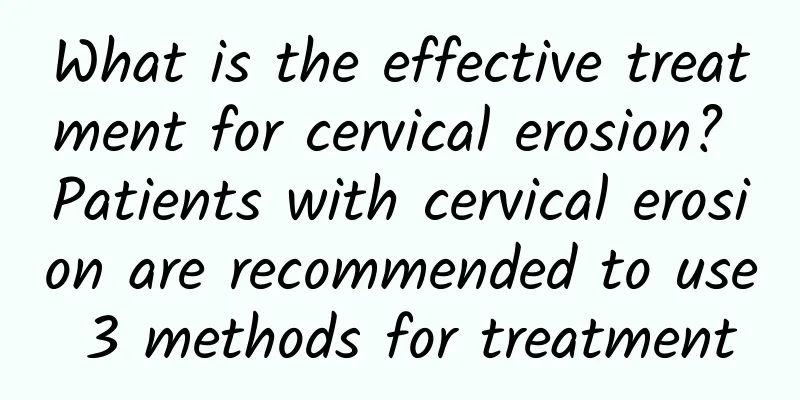What medicine can relieve cervical warts?

|
Cervical warts are a common sexually transmitted disease. We have seen a lot about the treatment of this disease on TV or in newspapers. This disease is very harmful to people's bodies and has a very serious impact on people's normal lives. The following is a detailed introduction to what medicines can relieve cervical warts. 1) Podophyllotoxin (Eutoxin, Podophyllotoxin, Wart Di): This treatment is suitable for warts in moist areas, such as warts on the glans penis and perineum that occur in patients with excessive foreskin and have not undergone circumcision. However, podophyllotoxin cannot be used to treat cervical warts. (2) Antiviral drugs: 5% phthalamide cream or 0.25% herpes net ointment can be used, applied externally twice a day. Acyclovir can be taken orally, 5 times a day, 200 mg each time, or its ointment can be used externally. α-interferon can be injected 3 million units daily, five days a week. Or 3 million units of interferon can be injected into the base of the wart, twice a week. Use for 2-3 weeks. The main side effect is flu-like syndrome. (3) Corrosive agents or disinfectants: Commonly used are 30-50% trichloroacetic acid or saturated dichloroacetic acid, or 18% peracetic acid. Use a mixed solution of 10% salicylic acid, glacial acetic acid, or 40% formaldehyde, 2% liquefied phenol, and 75% ethanol distilled water (100ml), apply it locally, and apply it to the glans penis and perianal condyloma a day or every other day, the effect is very good. Disinfectants can be applied externally with 20% iodine tincture, or 2.5-5% iodine tincture can be injected into the base of the wart, 0.1-1.5ml each time, or Sanisol can be applied externally or 0.1-0.2 externally, the latter needs to be combined with systemic therapy. (4) Anticancer drugs ① 5% fluorouracil (5-FU): Generally, 5% ointment or cream is used externally, twice a day, and a course of treatment is 3 weeks. 2.5% to 5% fluorouracil wet compress is used to treat penile, perianal and cervical condylomata, and each application lasts for 20 minutes, once a day, and 6 times as a course of treatment. Polyethylene glycol can also be used as a matrix, and 5% 5-FU powder is added to its dry matter to make suppositories to treat male and female urethral cervical condylomata. 5% 5-FU base injection can also be used, and more can be injected in batches. ②Thiotepa: Mainly used for urethral cervical condylomata that have failed to be treated with 5%-fu. Use suppositories (each containing 15mg) daily for 8 consecutive days. You can also add 60mg of this product to 10-15ml disinfected water and drip it into the urethra every week for half an hour. The side effect is urethritis. You can also use 10mg of this product to soak the affected area 3 times a day for half an hour each time to treat penile and glans coronal sulcus condylomata. It is mainly used for those who still have residual warts or relapse after treatment with other methods. You can also dilute this solution twice and soak the local area to prevent recurrence. ③ Colchicine: 2% to 8% saline solution can be applied externally, twice, with an interval of 72 hours to treat penile warts. Superficial erosion may occur after application. There are many kinds of drugs for herpes and condyloma, and their treatment mechanisms are different. Improper use will increase the burden on the liver, so they should be used selectively. When using antiviral drugs, you should also pay attention to identifying the side effects that lead to poor liver and kidney function. Only by treating both the symptoms and the root causes can you achieve the goal of protecting your health and removing viruses from your body. |
<<: What medicine is good for cervical warts
>>: What medicine is best for treating cervical warts?
Recommend
Precautions for Trichomonas vaginitis
Trichomonas vaginitis often recurs after menstrua...
Can I go back to work after two days of rest after abortion?
Abortion is artificial miscarriage. Doctors will ...
The following are some of the factors that affect the price of abortion surgery:
The price of abortion surgery is a problem that m...
Who is prone to Bartholin's gland cyst symptoms and causes
Women of childbearing age, especially those with ...
Does microwave treatment of cervical erosion affect fertility?
Does microwave treatment of cervical erosion affe...
Commonly used drugs for treating dysmenorrhea
Commonly used medications for dysmenorrhea: 1. Ge...
Cases of Cervical Precancerous Lesions Cured
Cervical cancer is the only cancer among all huma...
Can I eat black fungus if I have premature ovarian failure?
Patients with premature ovarian failure can eat b...
Experts analyze the common causes of dysmenorrhea for you
Dysmenorrhea is a gynecological disease that occu...
Patients with pelvic inflammatory disease should always pay attention to their symptoms
The occurrence of pelvic inflammatory disease wil...
What causes uterine fibroids? What should an unmarried girl do if she has uterine fibroids?
What causes uterine fibroids Uterine fibroids are...
Make exercise safe and effective ~ 3 suggestions from doctors to patients with arthritis
You may have heard your elders say: Now that join...
What is the reason for cervical bleeding? Cervical bleeding may be caused by these 3 factors
Some women may find themselves bleeding when goin...
The key to preventing cervical precancerous lesions
How should we prevent cervical precancerous lesio...
Eat a lot of delicacies during the Mid-Autumn Festival, but your weight drops sharply? ! 5 Diet Tips to Eat Healthy and Without Burden
The Mid-Autumn Festival is approaching, and we of...









